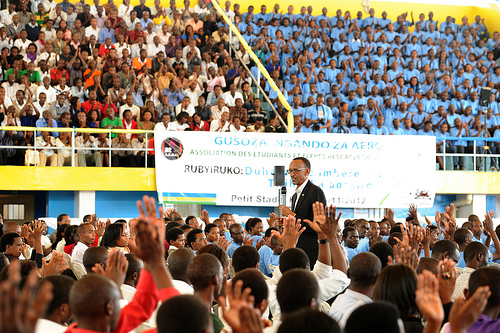
The National Commission for the Fight Against Genocide (CNLG) has recently released an important piece of research on the psychosocial situation of orphaned youth survivors. 19 years on from the genocide against the Tutsi, many survivors continue to face challenges in life as a consequence of the devastation and loss that the genocide caused. A particularly vulnerable group of survivors are those who were very young during the genocide, often orphaned and made homeless.
The research draws on interviews with 122 orphaned youth survivors from each district in Rwanda as well as focus groups with organisations supporting survivors. The results of the research revealed that psychological and social problems continue to affect youth survivors 19 years on. This is often related to continued traumatic memories and reminders of the genocide, social isolation and lack of family. They face complex issues connected to rural isolation, property, compensation and lack of educational resources. A third of participants expressed a negative or unclear outlook on their future.
Importantly, the results also revealed that the participants found the emotional and material support of survivor’s organisations very helpful. Many talked about the relief they got from sharing their experiences with others and the positive relationships with friends and other members of the community. Nearly half of the participants reported having plans or motivation for the future that guided their lives, giving them hope and emotional stability.
Participants highlighted the impact of the Government Assistance Fund for Vulnerable Survivors (FARG) in supporting the associated costs for orphaned survivors to access education. However, despite this valuable contribution, as well as the good work of survivor’s organisations, nearly 70% of participants expressed a belief that the material support they received did not meet their needs. They also highlighted gaps in services and it is clear that more needs to be done to ensure that all young survivors can access resources, on time when they are needed and that information about sources of support is readily available.
This research has major implications on how support to young survivors needs to be developed in the years ahead. At present, Survivors Fund (SURF) supports the work of the National Student’s Association of Genocide Survivors (AERG) to deliver access to education, and legal aid to document and follow-up on unresolved cases affecting young survivors in membership of the organisation, pertaining to disputed issues of property, land and property in particular.
As well, a new trauma and legal aid helpline, made possible through funding from inspire!africa, has recently been launched to provide access to emotional and professional support for young survivors that otherwise are isolated. This work is complemented by a youth entrepreneurship training programme, developed by AERG in partnership with SURF, which is providing business opportunities for young survivors, and real hope for a better future.
